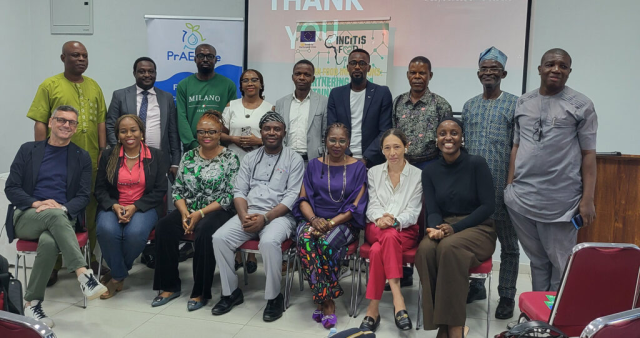A Horizon Europe project funded by the European Union, PrAEctice, is developing a technological tool to improve farming practices in Sub-Saharan African countries.
During a workshop held in Lagos in June, themed “Research to Commercialisation: Case study of Horizon Europe Projects.” Apodissi, one of the project’s partners, has announced that this tool, known as the Decision Support Tool (DST), will be commercialised by the team in Nigeria.
The workshop explored how PrAEctiCe and another EU-funded research project, INICITIS-FOOD, are addressing agricultural challenges through sustainable practices and promoting the commercialisation of EU-funded research outcomes in Nigeria.
Nigeria is currently grappling with a serious food security crisis. With the country’s population projected to reach 400 million by 2040, experts have raised concerns over its readiness to meet future food and nutritional demands.
Speaking at the event, Dr. Oyebola Olusegun, a lecturer in the Department of Crop Culture and Fishery Management at the University of Ibadan, discussed the prospects of Nigeria achieving its food production targets.
“Our population may increase to about 400 million by 2050, and we are still far from achieving the Sustainable Development Goals related to food security. If we continue with our current systems, we will not be able to feed ourselves, let alone produce raw materials for local industries or export. We must address this now.”
He also highlighted how the project is addressing food security through its living labs in Ibadan, circular Agri-food technologies, cascade funding, co-creation activities, healthy food production, and biofertiliser production.
Some of the project’s innovation include low-energy pump aquaponic set up such as the waste water from fish tanks that is drained to the sump with a low-energy water pump that lifts the waste water to the plants’ grow beds of the aquaponic system, and solid waste, which accumulates Inside the blue digester tank collected as sludge for fertilizer production, zero-pump manual aquaponic Iteration attached to sawdust-bag yam/tuber crop production unit, and liquid fish wastewater for uptake by crop farmers from the stagnant Renewal fish production.
The Managing Director of Apodissi, Margherita Trestini, during her presentation, highlighted that the PrAEctiCe project is developing an application for farmers that will provide them with real-time data monitoring and analysis of key parameters such as water quality, soil conditions, and crop health.

She also added that the DST embeds AI-supported data transformation to combine data from different sources and streams into specified data products. The DST mobile application provides extension workers/advisers and farmers with relevant, timely information about the specifics of their production process in order to address particular concerns they are facing at any given time.
“The PrAEctiCe decision support tool is under development in the form of three applications and is currently at TRL 7, aiming at TRL 8 by Q1 of 2026. Apodissi is discussing with its partners the commercialisation strategy in Nigeria by APODISSI, in collaboration with Maribor University, which developed the DST application and the technical partners, experts in IoT Water/Soil quality sensor systems, Aquagri IIM – International Irrigation Management, and AquaBiotech Limited.
“We will leverage our collaboration with three digital innovation hubs in Nigeria, DigiPlus Alliance, WiderNetFarms, and F-TAIP, which Apodissi is mentoring, to introduce PrAEctiCe DST, as well as Cooperatives, associations of farmers, and chambers of commerce across the country,” she added.
The Director of the Ministry of Agriculture and Food Systems, Omolara Abimbola Oguntuyi, who represented the Minister of Agriculture, Senator Abubakar Kyari, said these projects align closely with the Ministry’s priorities, particularly in promoting sustainable agricultural practices among women.







